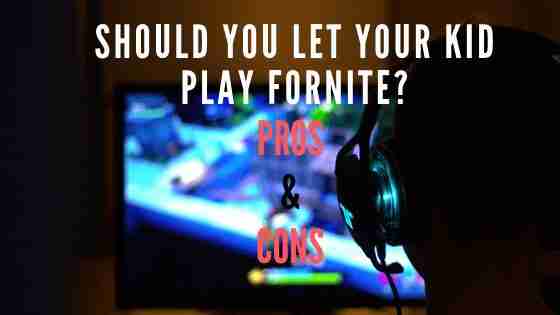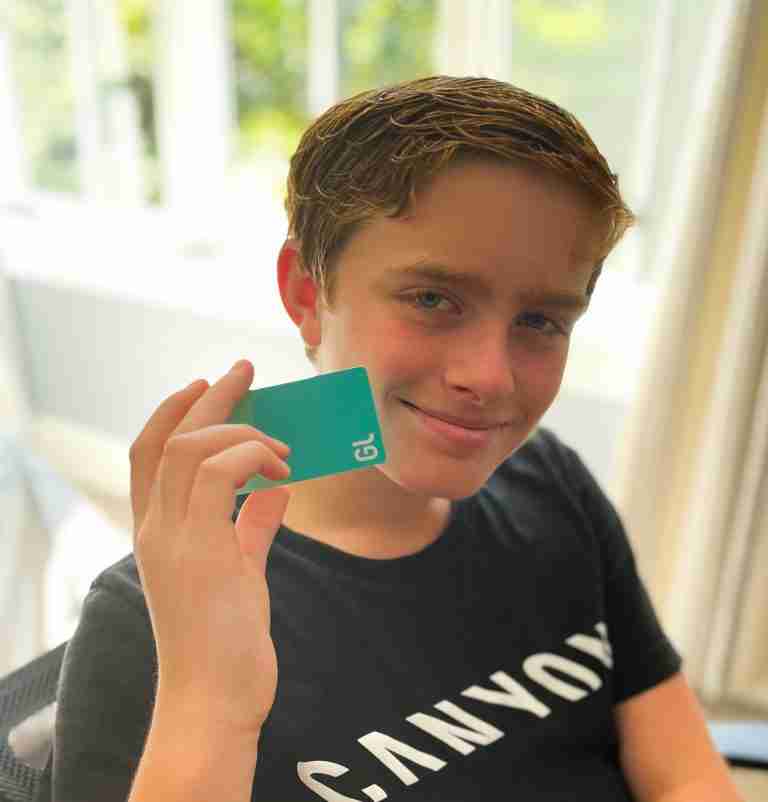The Pros & Cons of letting your child play Fortnite
Facebook
Twitter
Pinterest
It’s safe to say nearly every parent is acutely aware of the alluring Fortnite game. Fortnite now holds the record for the most game-related videos uploaded in a single month with an expected 250 million players in 2019. Crazy! Parents are invariably trying to regulate their child’s time spent playing Fortnite as well as other popular X-Box games. Consequently parents are consistently dealing with the nagging requests for approval to play video games. Both situations are incredibly frustrating. According to DMR, an average player spends 6-8 hours a week playing the game. Playing Fortnite is characterized as addictive.
Here, you will learn the pro’s and cons on letting your child play Fortnite and other addicting X-Box games. Teaching your child self-control and how to self regulate may be one of the most valuable lessons with big pay offs down the road.

WHAT IS FORTNITE ALL ABOUT?
Fortnite (now renamed as Fortnite Save the World) by Epic Games was inspired by The Hunger Games. Battle Royal is the most prominent game mode. The object of the game is to survive. Fortnite is a cross between Minecraft and a shooter game. In other words, it’s a competitive third-party shooting game. The game incorporates elements of crafting, building, problem-solving and mining options.
Battle Royal is the latest version of the game. It involves 100 players, where each player is dropped onto an island by a parachute. The player seeks to find construction materials, weapons and then fight each other in hopes to be the last player or team standing. Each player can only carry so many weapons at one time as you manage your loadout and equipment to survive. When you die, you are out of the game.
The non-competitive mode called Playground is where buddies can meet and practice or create their own activities, and in Creative mode players build and share their own mini Fortnite islands.
WHY KIDS LOVE FORTNITE
It is obvious to recognize why kids love the game. The game is free. The Fortnite characters and interface are cartoon-like, with no blood or gore. The game itself possesses a sense of humor and is lighthearted yet still competitive. The biggest draw is that the players can outfit their characters (for $) in various battle fashions and fun dances. I hate to admit this but the game is brilliant because it has it’s allure and it’s easy to play and learn.
WHAT IS V-BUCKS?
It is a virtual currency to buy outfits (skins) and other items. One V-buck is about equal to a penny, and the fewest you can buy at once is 500 which is listed at $4.99. These offers can change from day to day, so this keeps the kids intoxicated by the game.
The biggest thing I don’t like about Fortnite is V-Bucks only because kids constantly want something new from the item shop. It drives me nuts! I have an issue with playing money for non tangible items.
The following is a list of pros and cons of letting your kids play addicted games like Fortnite.
pros
cons
Builds Executive Functioning Skills
The game requires a lot of skill. Players need to gather equipment, build forts and engage in battles. These tasks call for flexible thinking and planning. Team play and collaboration is also a big part of Fortnite.
It’s Social
In Fortnite, players chat with their partners or squads as they compete and try to win. Children who are shy and have a tough time connecting with other kids can learn how to find common ground with peers. o It is also an excellent way to connect with friends no matter where they live.
Teamwork
Your child can bond with companions by forming teams and working together. My son will often play with pals in the same room but more often the kids connect from their own homes. They frequently make plans to be on-line at a designated time, so they learn team-building skills.
It’s Free
Popular Topic of Conversation
When kids have a common interest, then conversation breaks wide open because there is so much to discuss. When kids don’t play Fortnite, they often feel left out of the discussion.
Leverage
Fortnite is the ideal tool to keep your kiddo on task with homework and chores. If responsilbilits are not met then our son does not get to get online and play.
Develops Creativity & Imagination
These traits are good for kids to learn.
The Game Is Addicting
You have to manage screen time. Players find Fortnite challenging to stop playing so it is a continuous struggle to manage the time spent playing the game.
Exposure To Guns and Weapons
There is no blood and gore but the game is still considered violent by many.
Chat Feature
Fortnite is a group game which means that kids play against other gamers that they know and perhaps strangers. However there is a way to control who your child plays with.
Virtual Currency
Kids can get sucked into the desire to purchase skins (outfits for their characters) weapons and animations.
Increased Anxiety
If your child is prone to anxiety or stress, the fast-paced game may not be ideal for them.
Feelings of Exclusion
If you child doesn’t play Fortnite, they may feel excluded in conversations at school when kids are chatting about the g
TEACHING SELF CONTROL
Self-control has been defined in many ways–as willpower, self discipline, or conscientiousness. However, you define it, restraint is about being able to regulate yourself. Longitudinal cohort studies consistently find that self-control in childhood best predicts health, wealth, and happiness in adulthood.
This kind of self discipline is essential because teens will eventually be tempted by alcohol, drugs and other dangerous activities at some point in their lives. With that said, I want my son to learn how to resist distractions, inhibit impulses, deal with delayed gratification and plan ahead. It’s important that my son will make appropriate decisions and respond to stressful peer situations in ways that yield positive outcomes as he grows up. For this reason, I let my son play Fortnite with strict guidelines — mind you.
how to self-regulate and manage digital temptations
It’s critical for young kids these days to learn how to self-regulate and manage temptations, especially when it comes to technology and social media these days. Think about how difficult it is for all of us to put down our cell phones. Kids these days live in a digital world, they don’t know any different. Technology will be a part of their entire life, so why not teach them how to have self-control now?
For instance, my oldest son’s first college roommate flunked out of school his first semester because he was addicted to gaming and stayed up all night playing and then slept through his classes during the day. It’s hard to imagine.
If you allow your child the opportunity to self-regulate and resist temptations, when they are young, it will pay off later on in life on many levels. Kids will not learn how to self regulate by playing Fortnite for hours, but if you allow your child to only play video games after homework and chores are done helps teach self-control. It’s good practice for when you child grows up and goes to college.
By allowing my 11-year-old to play an addicting game like Fortnite in a safe and restricted environment, he will learn more about himself and how to manage his time with our guidance best. After playing the game for over 6 months now, my son has declared he is kinda tired of the game now. Who knew?
BUILD TRUST WITH YOUR KIDS
We are very open with our kids, and you can be sure that we tell our son why gaming concerns us, so he understands our position. We also sincerely tell our kids, we trust them to make the right decisions. Empowering kids this way has always paid off.
The ultimate lesson of trust with your child is instilling confidence in the parent-child relationship. Open communication between you and your kids opens the door for them to ask questions to get honest answers. When my son is acting responsibly, I reward him with privileges that are extended because trust has been forged. However, when trust has been broken, then it’s the ideal time to let them know that the privileges will not be extended. Online gaming is a privilege, and it works well as a tool for us.
Here are evidence-based guidelines for your son or daughter playing video games:
- No more than 40 minutes a night on school nights.
- No more than an hour a day on weekends.
- Minutes do not roll over: if you go three weeks without playing, that does NOT mean that you are allowed to spend seven hours on a Saturday playing video games. That’s binge gaming, and it is harmful.
- No games where the objective is to kill people. That means no Fortnite, no Call of Duty, no Grand Theft Auto. NBA Live is fine. Wii Bowling is fine. Madden NFL Football is fine. Candy Crush is fine.
- No games until all the homework is done and all the chores are done.
TAKE AWAY:
With that said, there is no right or wrong decision about allowing your child to play Fortnite or not. You have to know your child. The bottom line is talk with your child about self control, trust and consequences. Good luck! Let me know your thoughts.
Best,








